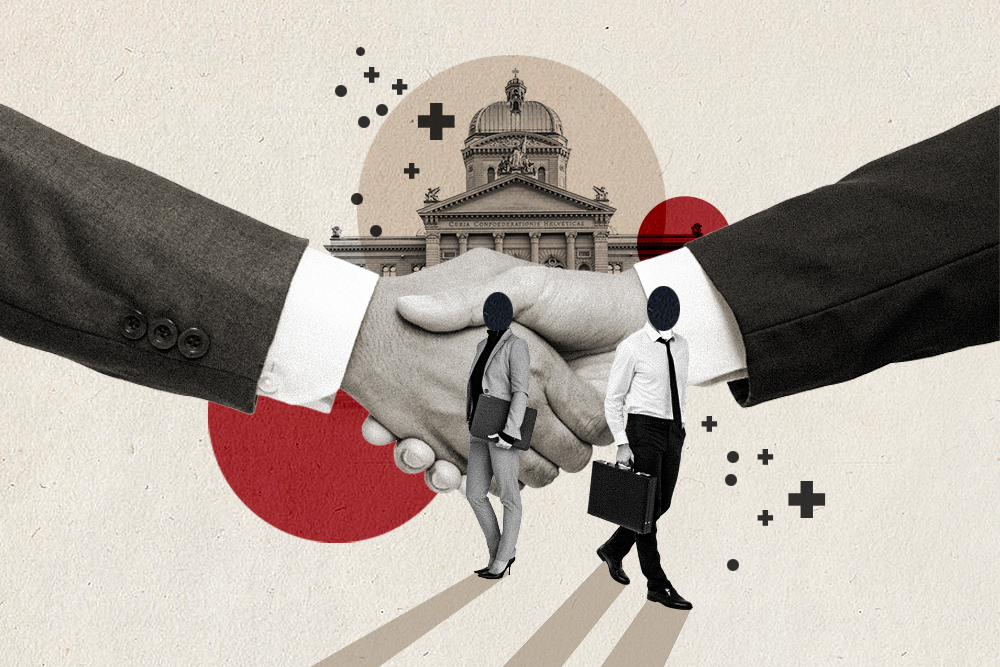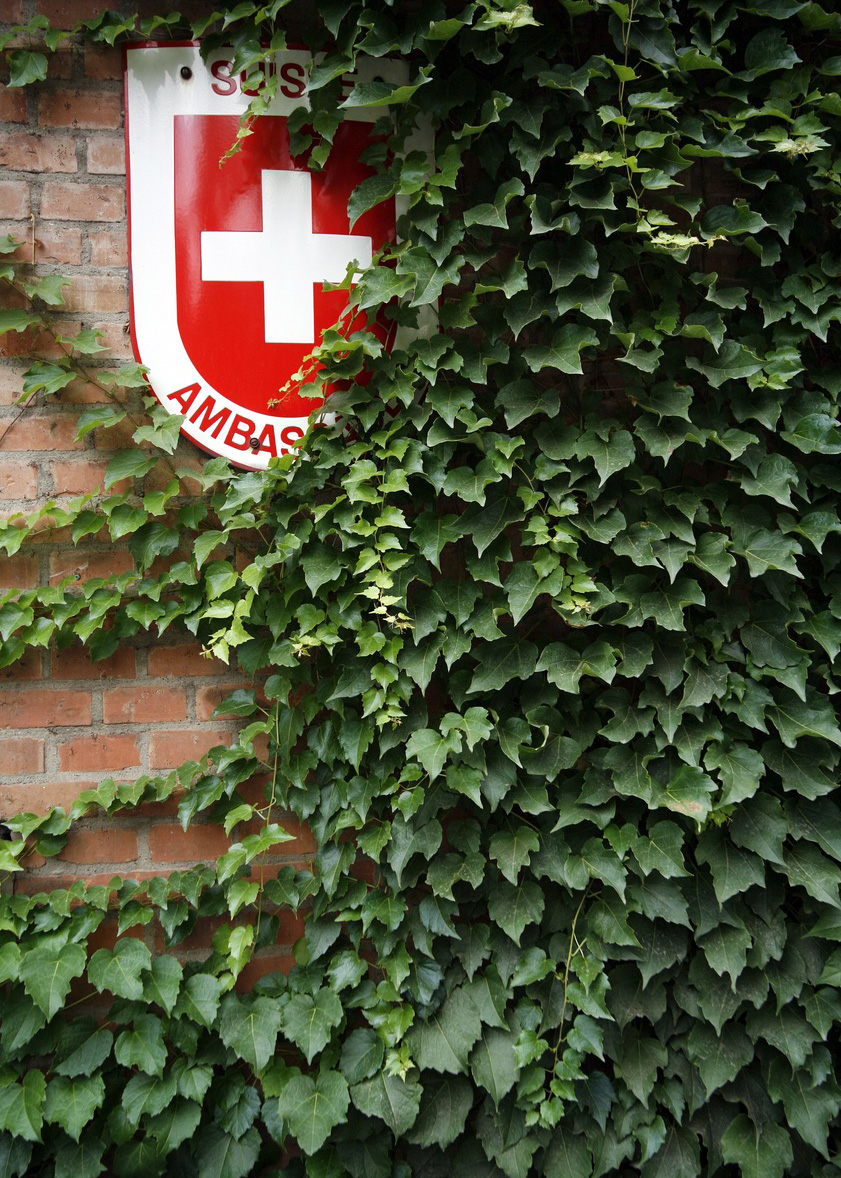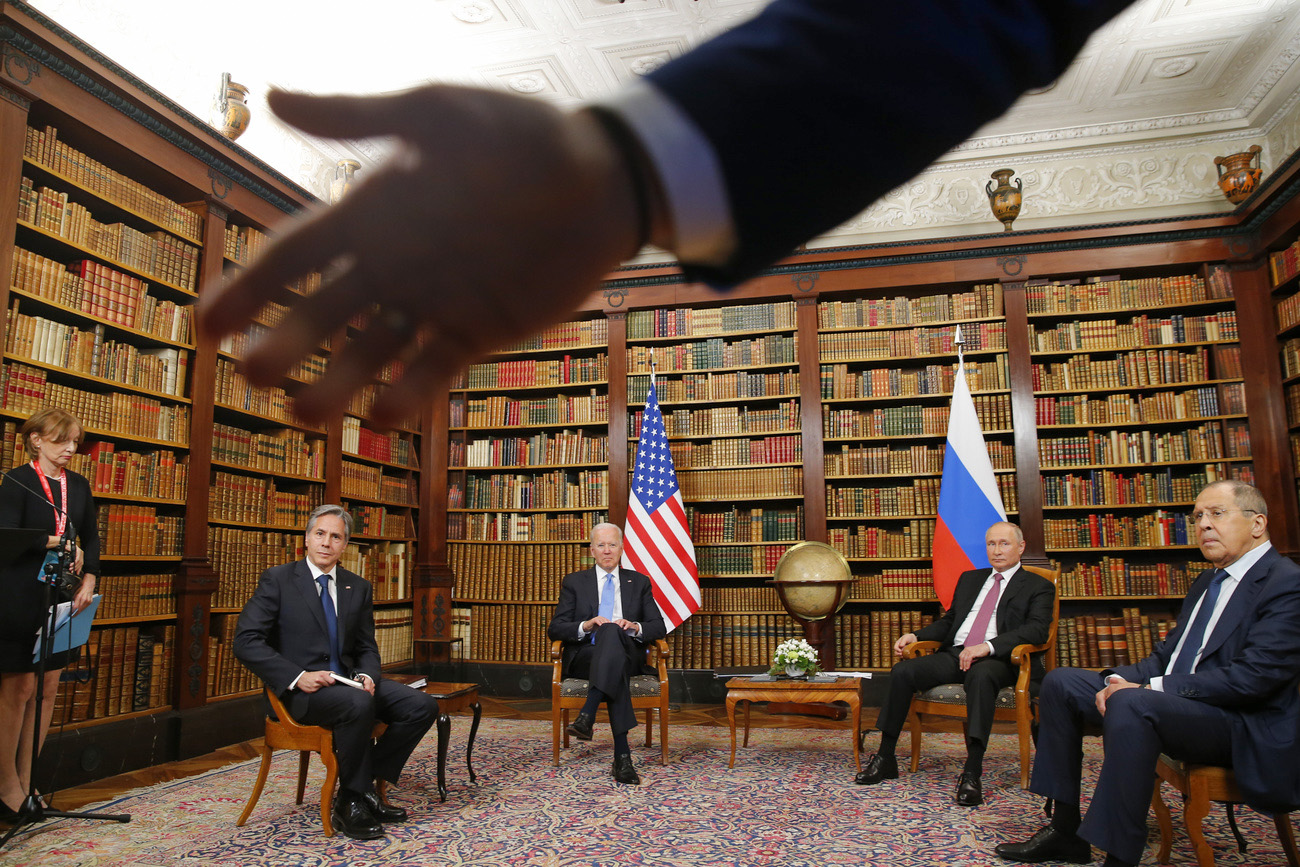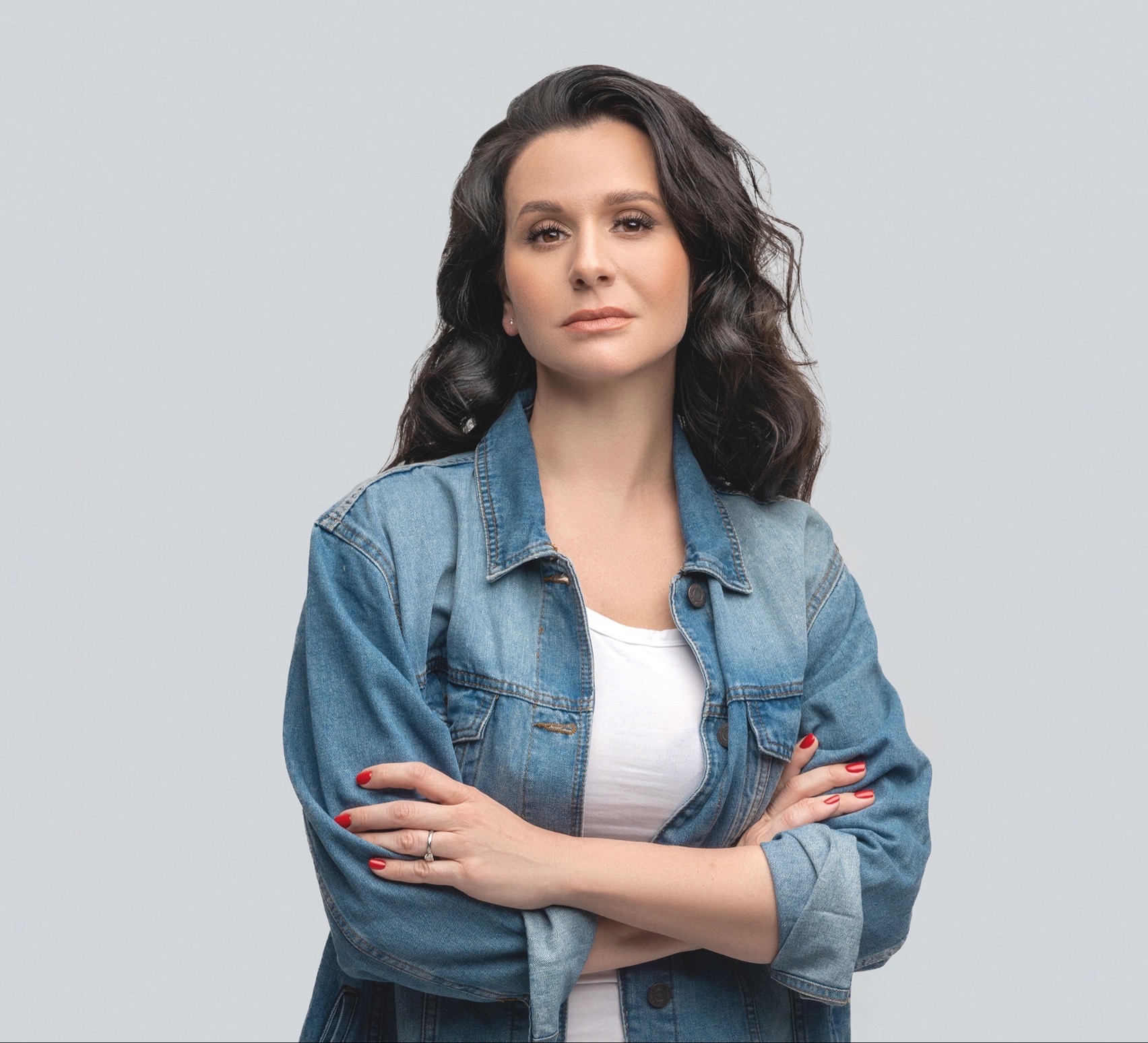
Behind the scenes of Swiss diplomacy: salaries, facts and neutrality

Who are Swiss diplomats? How do they work? How much do they earn, and how does this differ from other countries?
In Switzerland, being a diplomat means representing a country that is neutral and – on paper – doesn’t take sides. While the neutrality label comes with the accusation of opportunism, it has also allowed Switzerland to position itself as a mediator for peace.
SWI swissinfo.ch sheds light Switzerland’s diplomatic corps, often shrouded in myths of secrecy, how they work and operate.
1. What professional background do Swiss diplomats have?
The Swiss foreign ministry recruits professionals up to 30 years old with diverse work experience as well as experience abroad. Language skills are key and Swiss citizenship is a must (dual nationality is permitted). The diverse and varied tasks of the members of the Swiss diplomatic corps require diverse and varied profiles and training.
Entering early allows diplomats to grow within the system through regular rotations to potentially reach the position of ambassador. In the 1950s the foreign ministry launched what it called the concours diplomatique, a recruitment process which required every contestant to sit several exams, both written and oral. At the time a law degree was required to join the diplomatic service and participate in the process. Nowadays, any master’s degree is accepted – the foreign ministry is hiring engineers, social scientists, economists and medical doctors. These allow for profiles more adapted to transferrable careers or roles that allow mobility between departments and postings abroad.
This hybrid system, which favours recruiting both younger and more senior professionals, is similar to that in countries such as CanadaExternal link or the United StatesExternal link. It differs from the diplomatic track in countries such as Russia, China or JapanExternal link, for instance, where most diplomats are recruited at a young age and make their way up the ranks. In this case it’s rare for diplomats to enter on merit halfway through their careers.
In 2023 the French president Emmanuel Macron dismantled the diplomatic corps. Until then, France offered two main routes into diplomacy: the first through the École nationale d’administration (ENA),which was abolished in 2021 and replaced by the Institut national du service public (INSP);External link the second through specialised competitive exams organised by the Quai d’Orsay (Ministry for Europe and Foreign Affairs) — including the so-called Orient track, which recruits experts in international relations and rare languages like Chinese, Japanese, or Swahili.
This led to a two-tier system: Ambassadors (senior level) and Foreign Affairs Secretaries (junior level). The junior level often fed into the senior one — a classic internal career track. “When the diplomatic corps dissolved, technically any civil servant could now become a diplomat,” says Charles Malinas, former French diplomat. Malinas served as ambassador of France in the Central African Republic (CAR) from 2013 to 2016, and later as ambassador to the Czech Republic in 2016–2017.
“That’s a radical change and to be honest, it’s madness. It’s a real disdain from him (Macron)for diplomats at the top.”
He says that one of the most immediate effects has been increased control of diplomacy by the president’s diplomatic cell.
“Being a diplomat is a real profession. It’s not 9 to 5. You’re on duty 24/7 when abroad — it’s a lifestyle and a vocation,” says Malinas. “This requires real expertise and long-term training. Removing that distinction is dangerous — it’s not a job you improvise.”
Macron defended his reform by saying it would allow “more agile, expert and strong diplomacy”.
2. How often are Swiss diplomats posted abroad?

Swiss diplomats are expected to be versatile and willing to work both from Bern and across Switzerland’s representations abroad. Diplomatic rotations typically occur every three to four years. Many diplomats also serve in Geneva, representing Switzerland in international organisations such as the United Nations, the World Health Organization or the International Committee of the Red Cross (ICRC).
Roughly two-thirds of Switzerland’s diplomatic postings are abroad, with only one-third based at headquarters in Bern. Switzerland has 103 embassies abroad, along with nine permanent missions, 225 consulates (including honorary consulates), 15 cooperation offices and three other types of representations. In comparison, Belgium has 80 embassies, 297 consulates and three representations.
In 2024, the Swiss foreign ministry employed over 5,300 people. Among them were 375 diplomats, 472 consular staff, 295 specialists in international cooperation and 2,962 locally recruited employees and honorary personnel stationed overseas.
3. How many Swiss diplomats are recruited each year?
In Switzerland, admission is based on open competition, language skills and merit. Joining the Swiss diplomatic service means passing the rigorous concours diplomatique. The foreign ministry usually hires once a year; the next call for applications will open at the end of May. A master’s degree from a Swiss university or a recognised institution in the European Union or European Free Trade Association is mandatory.
Level C1 (advanced) in at least two of Switzerland’s official languages (German, French, Italian) and English is required. The candidate will sit six oral examsExternal link covering public international law, constitutional law, politics, economics, history and general knowledge as well as a 90-minute written analysis on one of two proposed topics, completed online. The admissions commission evaluates background, personality, motivation, stress management, and ability to think critically and argue convincingly. In 2024, a total of 211 candidates applied and 15 were admitted, reflecting a selection rate of 7.1%. The next recruitment process (concours)External link will be open from May 25 to June 16, 2025.
4. Are Swiss diplomats really neutral?
Switzerland’s neutrality is regularly criticised. The country is accused of either being too passive or too active.
This has particularly been the case in the context of the war in Ukraine. Switzerland has been accused by Russia of losing its neutrality and adopting a pro-Ukrainian stance by providing support and aid to the country. EU diplomats meanwhile welcomed Switzerland’s sanctions on Russian assets.

For Swiss diplomats, being neutral does not mean suppressing criticism. Switzerland has a long history of imposing sanctions on countries, individuals and organisations.
For many years, it has done so either by aligning with the European Union or by implementing sanctions adopted by the United Nations Security Council. After Russia’s invasion of Ukraine, Switzerland aligned with the EU by imposing a series of sanctions on Russia and granting Ukrainian citizens a refugee status. It also froze some CHF7.4 billion ($8.9 billion) of Russian assets. As a neutral country, Switzerland has a defence industry that produces ammunition for weapons, some of which ended up in Ukraine.
However, under Swiss law, countries that buy Swiss arms are banned from re-exporting them to parties involved in armed conflicts – a rule that has been at the centre of intense debate since the beginning of the war in Ukraine.External link
5. Are Swiss diplomats rich?
While it’s true that senior diplomats, particularly ambassadors, can earn relatively high salariesExternal link (CHF31,000 per month, or CHF405,000 per yearExternal link, this is not the rule. Most Swiss diplomats start at around CHF106,000 per year, which corresponds to about CHF8,185 per month (before taxes and deductions). As a comparison, the average annual salary in Switzerland is CHF81,456.
The job comes with long hours, political pressure and relocations every three to four years. Diplomatic postings can range from Geneva or New York to conflict zones or remote capitals. Housing and benefits vary greatly depending on the country and the posting. Behind the formal receptions and protocol is a role that often involves negotiations, emergency responses and crisis management. In 2025, US Foreign Service officers earned a base salaryExternal link ranging from $34,454 (CHF28,700) to $162,672 per year depending on their category. Those serving abroad receive an additional 22.62% locality pay, an adjustment to achieve salary comparability with the private sector, bringing top overseas salaries up to $195,200 per year. This is in line with Swiss compensation.
How much do diplomats earn around the world?
6. Who decides Switzerland’s foreign policy?
Switzerland’s foreign ministry is different from foreign ministries in countries such as Russia, France or the United States. Unlike in those countries, the Swiss diplomatic service is not part of a strict political hierarchy. It operates within Switzerland’s collegial government, where all seven members – including the foreign minister – are equal in status. Foreign policy decisions are made collectively, not by presidential command or ministerial fiat. In Russia, the foreign ministry is tightly controlled by the Kremlin. Russian Foreign Minister Sergei Lavrov reports directly to the President Vladimir Putin,External link and diplomacy follows a vertical power structure with no independent space.
In France, Jean-Noël Barrot, the minister for Europe and foreign affairs, is a politician with dual French and Swiss citizenship. Even if the minister is a high-profile political figure, strategic decisions come from French President Emmanuel Macron. US Secretary of State Marco Rubio was nominated personally by US President Donald Trump. The US State Department has strong institutional capacity but little independence from the White HouseExternal link. In Switzerland the foreign ministry reflects the country’s neutrality and decentralisation.
It doesn’t make foreign policy alone – policies are defined and implemented as part of a broader national consensus. Foreign policy is set for four years at the beginning of each legislative period by the government. There’s no dominant party line, no global ambitions and no political showmanship. This is not the case in the US for instance, where Rubio is key to implementing Trump’s foreign policy goals.
Russia’s Ministry of Justice has officially labelled former Foreign Minister Andrei Kozyrev (1990-1996) a “foreign agent”. According to a statementExternal link published on the ministry’s website on April 11, Kozyrev spoke out against Russia’s war in Ukraine. The ministry also noted that he “interacts with foreign platforms and resides outside the Russian Federation”.
In 2022, Kozyrev publicly condemned the full-scale invasion and called on all Russian diplomats to resign in protest. “Dear Russian diplomats, you are professionals, not cheap propagandists. When I worked at the Foreign Ministry, I was proud of my colleagues. Today, it is simply unacceptable to support a bloody fratricidal war in Ukraine,” he wrote on social media platform X.External link
7. Does Switzerland holds secret negotiations and backchannel communications?
Secret negotiations in Switzerland are not a myth. In recent months, the country has hosted unofficial backchannel meetings between American and Russian figures.External link
While the participants were not official envoys, some had backgrounds in diplomacy and security. These meetings, held during the post-election transition period in the US, highlight Switzerland’s enduring role as a neutral ground for sensitive dialogue.
As a neutral nation, Switzerland has a long tradition of acting as a discreet intermediary, offering its support to countries in conflict through what is known as “good offices”, where they mediate for two opposing parties.
Through the past decades it has for instance represented US interests in Iran and Cuba as well as mediated talks between Turkey and Armenia that led to the Zurich ProtocolsExternal link in 2009. The two protocols signed by Armenia and Turkey included provisions for the establishment of formal diplomatic relations between the two countries. In 2012, Switzerland supported the Colombian government’s peace process with the Revolutionary Armed Forces of Colombia – People’s Army, also known as FARC, contributing to an agreement between the two parties.
Edited by Virginie Mangin/gm/ts

More
Our newsletter on geopolitics

In compliance with the JTI standards
More: SWI swissinfo.ch certified by the Journalism Trust Initiative






























You can find an overview of ongoing debates with our journalists here . Please join us!
If you want to start a conversation about a topic raised in this article or want to report factual errors, email us at english@swissinfo.ch.